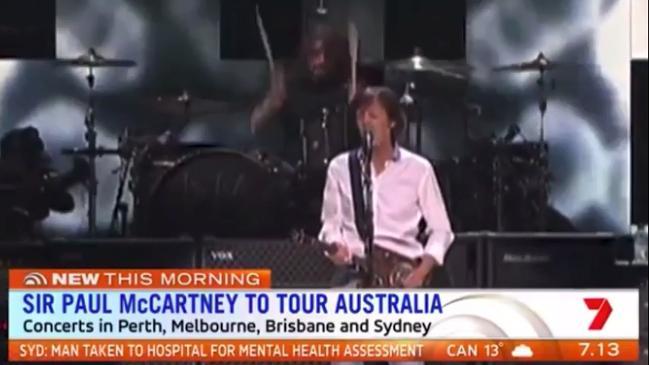World’s greatest songwriter has world’s worst grammar
PAUL McCartney’s biggest hits are plagued by basic grammatical errors and non-sequiturs. This outrage needs to be acknowledged at long last.

EVERYONE on the planet knows that Paul McCartney is the greatest songwriter of all time and the driving force behind the greatest band of all time — by which I’m obviously referring to Wings.
But what has been swept under the carpet during his six-decade billion-dollar career is that he has absolutely terrible grammar.
In fact, many of McCartney’s biggest hits are plagued by basic grammatical errors and non-sequiturs.
Of course, this has been largely ignored by his millions of fans on account of the fact that he is a musical genius.
However, now that he has announced his first Australian tour in almost a quarter of a century, it is time that Sir Paul learnt what social media has taught the rest of us in recent years: We are living in the age of the Grammar Nazi.
And so in that spirit I present …
PAUL MCCARTNEY: A CATALOGUE OF GRAMMAR FAILURE
Love Me Do
The first ever Lennon-McCartney single in the UK was composed primarily by Paul and you don’t even have to go past the title, which sounds like it was written by Yoda.
Obviously this is a complete garbling of the imperative mood and at best is missing a comma, as in: “Love me, do!” Even with the redundant third word, the correct usage should be “Do love me” or simply the vastly more efficient “Love me”.
P. S. I Love You
Ironically, in a song written about writing, McCartney commits one of songwriting’s worst faux pas (which, incidentally, is both singular and plural), which is to “rhyme” a word with the same word.
Unfortunately this is not uncommon, however McCartney manages to rhyme not just one but two words with the same two words and make this the central hook of the song:
As I write this letter, send my love to you
Remember that I’ll always be in love with you
For shame, Sir Paul, for shame.
For No One
One of the most hauntingly beautiful ballads ever written, and a centrepiece of the Beatles’ landmark album Revolver, this song nonetheless hinges on a deep logical fallacy in the second verse:
You want her, you need her, and yet you don’t believe her when she says her love is dead
Surely it is obvious to any student of human nature that if the protagonist both wants her and needs the object of his romantic affection he is unlikely to believe her when she says her love is dead.
Clearly the lyric should be:
Y ou want her, you need her, and therefore you don’t believe her when she says her love is dead
Martha My Dear
This is a love song Paul McCartney wrote to his sheepdog and yet remarkably that is not the most offensive thing about it.
Consider the opening verse:
Martha, my dear
Though I spend my days in conversation, please
Remember me
Firstly, this is a complete non-sequitur. Why on earth would a sheepdog not remember her master simply because he spends his days in conversation?
Moreover, with whom is he conversing? Obviously, if he is conversing with his sheepdog then it would be impossible for the dog not to remember him unless both were in the throes of dementia. And if he is conversing with someone else the dog would likewise be unlikely to forget him, even if he was in the next room. It is well documented that canines have excellent hearing.
Jet
Tragically, once McCartney went solo his songs made even less sense, grammatical or otherwise. Yet it appeared that the less sense he made the more successful he was. For example, the entire lyric sheet for his best solo album Band on the Run is utterly nonsensical, including one song called “Mamunia”, another whose entire chorus is “Ho hey ho, ho hey ho, ho hey ho, ho hey ho” and another in which he repeatedly declares “I’m a bluebird”.
However it is the album’s first hit single Jet which really takes the cake, with a chorus (or something) that is so devoid of any discernible meaning that it is hard to know how to even punctuate it:
Ah mater want Jet to always love me
Ah mater want Jet to always love me
Ah mater, much later
Perhaps tellingly, Jet was also the name of one of McCartney’s pet dogs, yet incredibly this fact leaves the lyrics making even less sense.
Live and Let Die
Naturally I have saved the best, which is to say the worst, for last. Unfortunately the only thing dying in this iconic James Bond anthem is the English language.
As half the planet knows, the song contains this unforgettable and unforgivable line:
But if this ever-changing world in which we live in
And it is enough to make any self-respecting pedant choke on their swaying cigarette lighter. There are TOO MANY INS! The “in” pertaining to “live” has already been covered in the middle of the sentence, leaving the second “in” redundant. To paraphrase a certain Bible story, there is no room for the in.
The correct form would be:
But if this ever-changing world in which we live
Having two ins in this sentence is like having too many wives in a marriage: It ends up less Live and Let Die and more Charles and Di.
However in order for it to scan properly, I suggest the following:
But if this ever-changing world in which we’re living
So there you go, problem solved.
Of course I knew before writing this that some people would think Sir Paul McCartney might have better things to do than read all of this crap. However if social media has taught us anything it’s that there is nothing celebrities like more than being corrected online.
Which reminds me, Paul, about this whole vegetarian thing …




